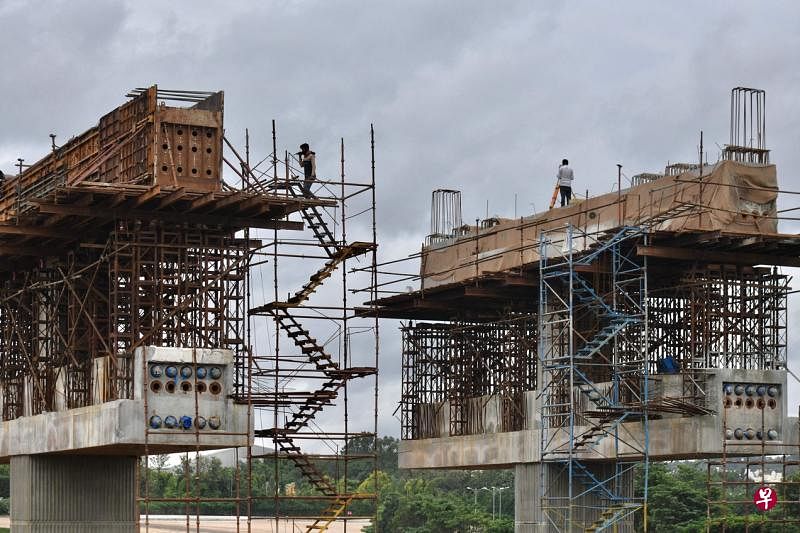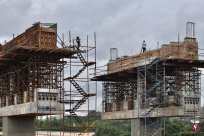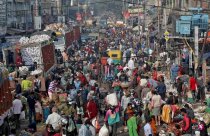
Special
In recent months, Western countries have launched a number of multilateral cooperation frameworks intensively to push the momentum of high school and American competition.International political observer believes that the Seventh Kingdom Group's launch of the "global infrastructure and investment partnership" is obviously seeking to be higher than that of China's "Belt and Road", but there are many bad records of digging walls in the United States.Be wary of the United States that may be pulled away halfway, causing infrastructure projects to abandon halfway.
The "The PARTNERSHIP for Global Infrastic and Investment (PGII) is to raise private and public funds for raising 600 billion US dollars (approximately S $ 83.09 billion) in infrastructure for developing countries in developing countries.Projects provide financing.This is the most obvious corresponding measures for China's "Belt and Road" initiative so far.
In addition, a few days before the launch of PGII, the United States, Australia, Japan, New Zealand, and the United Kingdom jointly established the "PARTNERS in The Blue Pacific (PBP), which aims to counter China's increasing influence in the Pacific regionforce.The Indo-Pacific Economic Framework (IPEF) launched in May (IPEF) is considered an alternative to the United States without returning to the Cross Pacific Partner Comprehensive Progress Agreement (CPTPP).
For a while, between the two major groups of the East and the West, developing countries have more options for multilateral cooperation mechanisms that promote infrastructure construction and economic development.
Li Zhiliang, a senior lecturer of the Chinese Institute of Malaya University, said in an interview with the United Morning Post that China and the United States are fighting the same batch of Asian countries that maintain a good relationship with China and the United States, but in essenceProvide public products in China.
He pointed out that there are certain differences in PGII / iPef and the "Belt and Road".For example, PGII / IPEF aims at sustainability. The fields that are concerned include climate change, gender equality, safe and reliable technology and supply chain, transparency, digital infrastructure and anti -corruption. Only digital infrastructure and climate change and "Belt and Road" "Belt and Road" "Following points overlap.
He said: "Obviously, the goal of Western countries is high -end public products, and Beijing's ability to provide public products for developing countries in Beijing is weak."
The United States exists in reputation
PGII's predecessor was the "Build Back Better World (B3W) program launched in June 2021.
B3W plans to provide less than $ 6 million to the world, including US $ 3.45 million for the development of digital finance and Internet services, and $ 2.3 million to apply for small solar suppliers.
Compared with the "Belt and Road" plan, the B3W provided by the Asian Infrastructure Investment Bank and the Silk Road Fund was not even called "peanut rice".Although the PGII founding capital promised by the Seven Kingdoms Group is much larger than the "Belt and Road", the professor of the Ministry of Political Establishment of the National Stato University of Japan also pointed out in an interview that developing countries must be cautious about the multilateral cooperation mechanism of Western countriesBecause there are many records in the United States digging allies' walls, not a partner of Jiuding.
He said: "The cooperation mechanism provided by the United States is not so stable, and even the allies do not fully trust the United States. The U.S. military urges Afghanistan to let the world see the United States self -interest, which is not completely trusted." During the administration of former US President Obama, the "Arab Spring" broke out in the Middle East, and former Egyptian President Mubarak fell to the United States.
During the Trump period, the United States turned to the inside, keeping a distance from NATO allies and Northeast Asian allies, and even threatened that the US military would evacuate unless they increased their expenditures in the U.S. military.After Bayeng came to power, the United States hurriedly withdrawn from Afghanistan, making the Afghanistan election government fall quickly.
The mid -term elections at the end of this year may also affect Biden's next foreign policy.The current support rate of Biden and the Democratic Party cannot exclude the possibility of changing his policy for changing policies to fight for voters.
US think tank: want to compete with Beijing to play higher education advantages
Kenny and Morris, senior researcher of the Global Development Center of the United States, believes that Washington should play an advantage of the United States, such as making good use of the higher education system and the dominant position of international multilateral organizations to compete with Beijing., Not investment developing countries and trying to build more infrastructure.
Kenny and Morris wrote a magazine in June in June that the United States launched the B3W plan in 2021 is a wrong approach."The United States is famous for investment and maintenance of domestic infrastructure, so it is meaningless to try to promote infrastructure projects abroad. It is best to leave these tasks to the United States dominant multilateral financial institutions, such as World Bank, such as World Bank,African Development Bank and other areas of multilateral banks. "
Do not catch up with China by investing in infrastructure
They believe that in the competition with Beijing, Washington should play its own advantages, including making good use of the United States' unparalleled higher education advantages.The United States should actively cultivate the next generation of leaders for the world, which is good for the United States' global leadership and economic development, rather than the launch of a construction company that is launched by global infrastructure funds to catch up with China.
Li Zhiliang also agreed with Kenny and Morris in an interview.But he also pointed out that Western countries have realized that it is not in line with the interests and advantages of Western countries in all levels of infrastructure construction.It can be seen from the field of PGII's attention that Western countries will invest in high -end infrastructure projects in developing countries, rather than mid -end or low -end infrastructure projects that China are good at.
China's "Belt and Road" is mainly for the construction of highways, bridges, seaports, power stations, railways, tunnels and 5G communication network facilities in developing countries.According to the latest number of this month, 181 projects of 33 countries have been approved, with a financing amount of 35.7 billion US dollars.
Helping Sichuan also believes that in the competition between China and the United States, the United States must be open and tolerant, otherwise it will push the values and political systems with different countries in the United States to the embrace of China.
He said that the United States is trying to incorporate the same ideological country into the democratic camp, and treat Sino -US competition as the competition between democracy and authoritarianism.
He pointed out: "The United States must respect political diversity more. If the United States is guided by him, it will only lead to the appearance and opposition of the group.This is unfortunate for the United States and those countries. "




